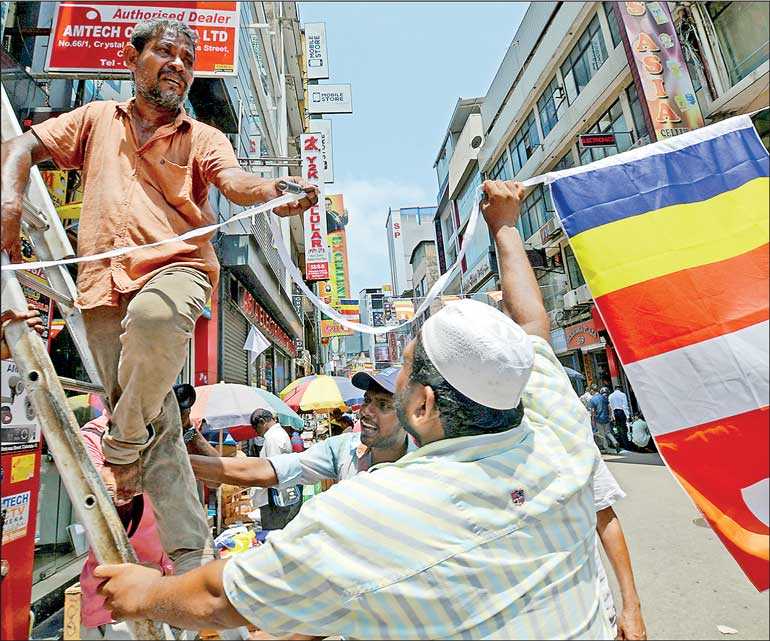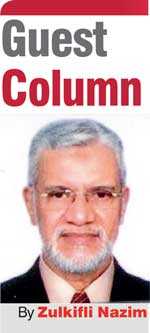Thursday Feb 26, 2026
Thursday Feb 26, 2026
Wednesday, 17 July 2019 00:00 - - {{hitsCtrl.values.hits}}

In Ashoka’s Edicts, it is rightfully stated, “Never think or say your religion is the best. Never denounce the religion of others. But honour in them whatever is worthy of honour.” 
[It is widely believed Ashoka the Great was the first leader to accept Buddhism and thus the first major patron of Buddhist art. Ashoka used the expression Dhamma Lipi to describe his own Edicts.]
Religions and unity
Religion is supposed to bring unity and understanding that could give us a central focus for general intentions of goodwill and cooperation. However, this is not how it has gone. This is mostly because each religion implies, or comes right out and says, that it is the best or the only way to God or the one and only path for salvation and all others are inferior and should be ignored, dominated, pushed away, or even destroyed by force.
In this way, one of the most difficult of all things to break down are the barriers between us that have been caused by our blind adherence to our religions. This is where division and sectionalisation begins.
A first-class religion is not the one that claims it is the highest religion. The first-class religion is that which teaches or trains one perfectly how to love other human beings. That is first-class; and in such a first-class religion, no one will claim to be better than any other. That is because he or she will naturally see that we are all the same and we are from the same source.
If you feel superior to others because of the fact that you are a Muslim, or Christian, or Hindu or some other religion, then that is where your religion has failed. For you to feel that way means that it has provided you with incomplete knowledge. And you have become a person motivated by irrational enthusiasm. You have become tendentious marked by a deliberate bias towards a particular viewpoint.
A fervent and militant proponent of something marked by excessive enthusiasm for and intense devotion to a cause or idealism – In short, you have become a fanatic. That means, you have not made much spiritual advancement. If your religion has failed to bring you to the spiritual platform in which you can see the spiritual similarities between you and all other creatures, regardless of caste, creed, culture, religion, country or species, then your religion has failed.
We now pose the question, is religion an instigator or a peacemaker in conflicts? To address such issues, it is imperative that religious leaders and scholars from various faiths join to explore the depths of history, theology and politics.
Politics and unity
Can politics create unity?
In Sri Lanka the hard path to solutions to the conflict against Sinhalese, Tamils and Muslims seems distant, the shock of the violence too fresh. It’s just amazing to see that so many are filled with that much hate against others.
Each change since the 2015 Presidential and General Elections has heightened the belief that other communities lack respect for your community and are indifferent to your needs. It feels like a duty to stand for your community when it seems under threat. As a result, we have reached a stalemate in politics and government.
Perceptions that “If you win, I lose” grow, then each side views the other political party and their supporters as a threat to the nation or their way of life if that other political party is in power.
For that reason, the incumbent’s followers tolerate more illiberal and increasingly authoritarian behaviour to stay in power, while the opponents are more and more willing to resort to undemocratic means to remove them from power.
This damages democracy. And we Sri Lankans are now stuck in animosity and anger that will undermine democracy, peace and unity.
Division and disunity are often stimulated by the rhetoric of political leaders who exploit the real grievances of voters. Most dangerously, words can unleash actual violence by avid supporters seeking approval from the leader or simply inspired to carry out an attack against the designated “enemy,”
These politicians choose divisive issues to highlight in order to pursue their own political agenda. In other words, what a leader says is as important as what he or she does.
It is important to remember that we cannot antagonise and influence for good at the same time. We can’t be a force for unity at the same time we are speaking angry words or throwing darts at others.
Calls for “unity” are as often used to squelch dissent or compel conformity as they are to strengthen social struggles. Certainly that is the road taken by sectarians, who operate on the principle that they will only unite with those who already agree with them.
There is a difference, then, between the unity of five fingers that makes a fist and the unity of disparate ingredients that creates a “nondescript brew.” There is an obvious way in which the term “unity” is abused — when it is used to create a false unity among classes and individuals with competing interests.
When bosses talk about “unity,” “togetherness” and “cooperation,” they are attempting cover up the antagonistic interests between capitalists and workers with the old slogan “we’re all in the same boat!” But in reality, someone is in a mahogany-panelled suite in first class elegant and classy environment, while someone else is in the boiler room shovelling coal.
The appeal of politicians for “national unity” has the same purpose — to create a false sense of unity between exploiters and exploited based on accidents of geography and birth. The purpose of patriotism is to chloroform you while certain other “patriots” pick your pockets or pack you off to war — and to convince you that the workers on the other side of your gun are your enemy.
The apparent simplicity of the idea of unity can be deceptive. We need a new approach to the political process, one that values problem solving over partisan combat. We have personal or partisan, business, political or religious differences which have been translated into a kind of demonising of those of different views,
We cannot understand as how we have gotten to this frighteningly divisive point in our history! To start with, major shifts in our political process, media and economy since the Year 2000 have encouraged division. Gerrymandering, separating and unfair division of voting districts to one’s advantage and massive increases in campaign contributions have incentivised partisan rhetoric – and to add fuel to fire, Social media amplifies these divisions.
Social media and unity
“What has been made possible now, in this modern world, is that we now live in media ghettoes. The new media resemble and reinforce the new politics, such that the most reliable way to succeed in either domain is to be the most noisome, outrageous, and polarising.”
A common phenomenon we experience today is extreme polarisation, people feel distant from and suspicious of the “other” camp – without examining their biases or the factual basis of their information, it is even more pronounced in the age of social media 24-hour news cycles and more politicised media outlets who repeat and amplify these forms of political attacks.
We have become increasingly partisan in our views and continue to learn how polarised and divided the nation has become. Their behaviour on social media is reinforcing each other’s thinking and communication are negatively increasing people’s passions while also driving them to polarising extremes. Moreover members of social media communities direct raw emotions into particular interests in order to have a spotlight on minority communities to be the chief ideological enemy.
What we are seeing are the old hatreds, dusted off and supercharged through social media Facebook, Twitter, Google, Instagram, YouTube and other chat platforms.
Now, in a time when national governments in many parts of the world are struggling to retain authority and trust, the internet accords opportunities for individuals to construct their own communities of interest and affinity, at the same time encouraging the ability of lone extremists to wreak havoc, is greater than ever before.
Analysing the statistics as at end of 2018 show that Sri Lanka has 6.71 million of internet users. This means 32% have access to the internet and are using relative gadgets and services. We also have 61.06% of overall mobile connectivity which means almost 27.38 million mobile connections exists in the country. Mobile penetration has risen to 131%. It should be noted that they belong to several age groups, educational levels and income brackets. Imagine what impact this could have on the country and against people and communities if abused. Social media outlets have changed the power dynamics of communication tools, adding that the new tools have spread knowledge and information horizontally to a larger segment of society; and therefore can be construed as a double-edged sword that is equally capable of enhancing social cohesion and inciting hatred that tears apart the social fabric.
Observations of users’ posts and comments on social media platforms show a growing anger and feelings of hate and disrespect, in addition to the use of confrontational speech, such incidents not only demonstrate a misunderstanding of freedom of expression, but also show misconceptions of major concepts and ideas that stir these hateful dialogues, such as secularism, liberalism, peace and corruption. Social media could threaten societal security, pointing to the increase in violations of privacy and acts of violence, adding that many users have developed a kind of “addiction” to these platforms.
Whilst acknowledging the potential of youth, we need to employ technology and information resources to improve society, citing social media tools as form of technology that should strive to enhance social cohesion and achieve societal advances that would allow to bridge the gap among various communities in the country We suggest the introducing of media literacy courses in schools, colleges and universities curricula in order to better equip the younger generation to deal with these platforms, teaching students how to differentiate between opinions and facts.
It is primarily the duty of the Government and those in authority and the duty of the citizens of this country to make sure this weapon which they have created isn’t inspiring this phenomenon to multiply.
It is time to demand that elected officials and thought leaders not play into the old divide-and-rule tactic. We have to remove social support for that approach and reward efforts to meet fundamental needs through problem-solving politics.
This is how we can confront and address the conditions that have led to crippling partisan division and create a more productive government. We can create a style of politics and communication that sets an example for and to the world.
Counselling from Lord Buddha: “When someone is mean, don’t listen. When someone is rude, walk away. When someone tries to put you down, stand firm. Don’t let someone’s bad behaviour destroy your inner peace.”
The writer counts over 50 years in the insurance industry and is an Associate of the Chartered Insurance Institute (London) and also holds the title of Chartered Insurance Practitioner; as well as an Associate of the Insurance Institute of India. He can be reached via email at [email protected].